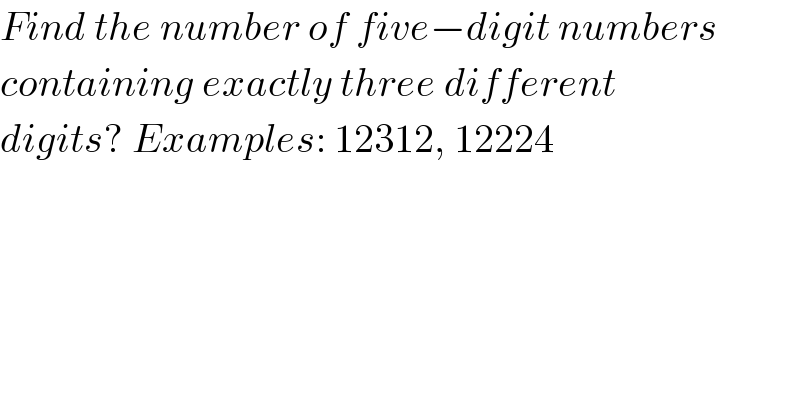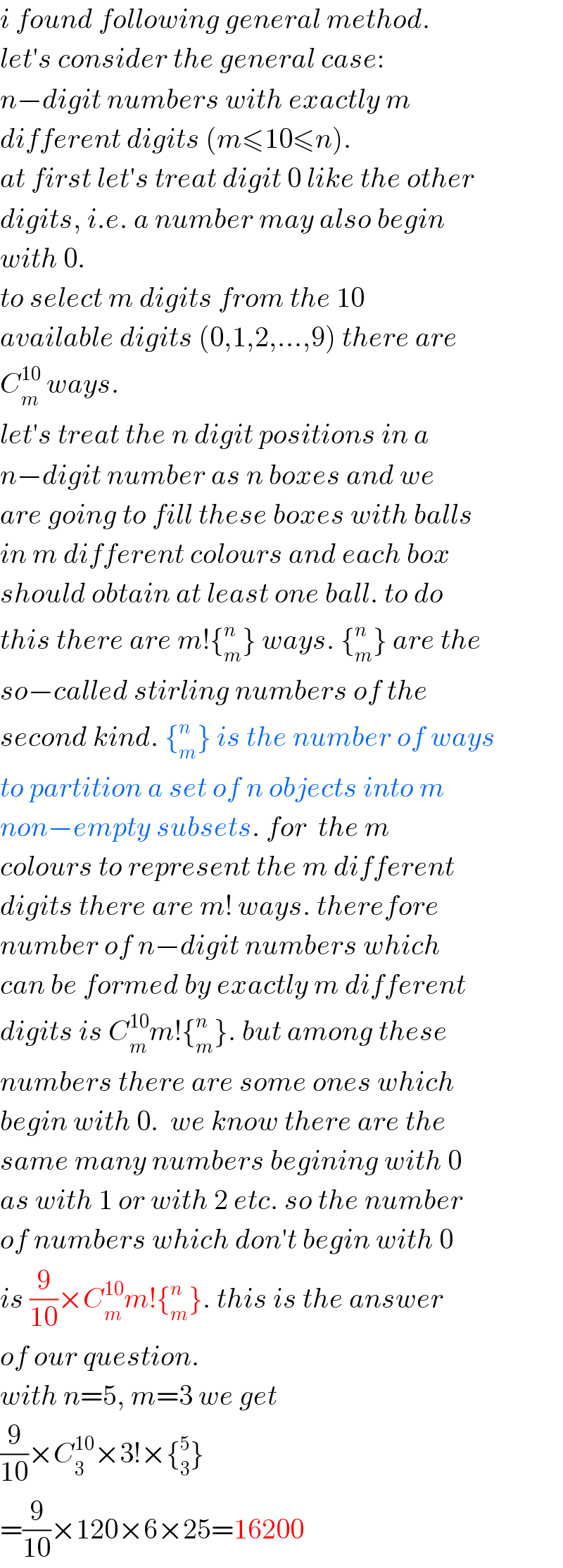
Previous in Permutation and Combination Next in Permutation and Combination
Question Number 100444 by mr W last updated on 26/Jun/20

$${Find}\:{the}\:{number}\:{of}\:{five}−{digit}\:{numbers} \\ $$$${containing}\:{exactly}\:{three}\:{different} \\ $$$${digits}?\:{Examples}:\:\mathrm{12312},\:\mathrm{12224} \\ $$
Answered by Rasheed.Sindhi last updated on 28/Jun/20

$$\:^{\bullet} {Let}\:{a},{b},{c}\:{are}\:{digits}\:{different}\: \\ $$$$\:\:\:\:{from}\:{eachother}. \\ $$$$\:^{\bullet} {First}\:{digit}\:\left({from}\:{left}\right):\:{a} \\ $$$$\:^{\bullet} {First}\:{two}\:{digits}:\:{a}\rightarrow{aa}\:{ab} \\ $$$$\:\:\:\left(\mathrm{2}{nd}\:{digit}\:{may}\:{be}\:{same}\:{or}\:{different}\right) \\ $$$$\:^{\bullet} {First}\:{three}\:{digits}: \\ $$$$\:\:\:{aa}\rightarrow{aaa}\:{aab} \\ $$$$\:\:{ab}\rightarrow{aba}\:{abb}\:{abc} \\ $$$$\:^{\bullet} {First}\:{four}\:{digits}: \\ $$$$\:{aaa}\rightarrow{aaab} \\ $$$$\:{aab}\rightarrow{aaba}\:{aabb}\:{aabc} \\ $$$$\:{aba}\rightarrow{abaa}\:{abab}\:{abac} \\ $$$$\:{abb}\rightarrow{abba}\:{abbb}\:{abbc} \\ $$$$\:{abc}\rightarrow{abca}\:{abcb}\:{abcc} \\ $$$$\:^{\bullet} {Five}\:{digits}\left({all}\:{possible}\:{cases}\right) \\ $$$$\:\:\:{aaab}\rightarrow{aaabc} \\ $$$$ \\ $$$$\:\:\:{aaba}\rightarrow{aabac} \\ $$$$\:\:\:{aabb}\rightarrow{aabbc}\: \\ $$$$\:\:\:{aabc}\rightarrow{aabca}\:{aabcb}\:{aabcc} \\ $$$$ \\ $$$$\:\:\:{abaa}\rightarrow{abaac} \\ $$$$\:\:\:{abab}\rightarrow{ababc} \\ $$$$\:\:\:{abac}\rightarrow{abaca}\:{abacb}\:{abacc} \\ $$$$\: \\ $$$$\:\:{abba}\rightarrow{abbac} \\ $$$$\:\:{abbb}\rightarrow{abbbc} \\ $$$$\:\:{abbc}\rightarrow{abbca}\:{abbcb}\:{abbcc} \\ $$$$ \\ $$$$\:\:{abca}\rightarrow{abcaa}\:{abcab}\:{abcac} \\ $$$$\:\:{abcb}\rightarrow{abcba}\:{abcbb}\:{abcbc} \\ $$$$\:\:{abcc}\rightarrow{abcca}\:{abccb}\:{abccc} \\ $$$$ \\ $$$${Total}\:{possible}\:{cases}\:\mathrm{25} \\ $$$$\:\bigstar{In}\:{each}\:{case}: \\ $$$$\:\:\left({let}\:\mathrm{U}=\left\{\mathrm{0},\mathrm{1},...,\mathrm{9}\right\}\right) \\ $$$$\:^{\bullet} {first}\:{a}\:{can}\:{be}\:{filled}\:{in}\: \\ $$$$\:\:\:\left(\mathrm{U}−\left\{\mathrm{0}\right\}\right)\:\:\:\:\:\:\:\:\:\:\:\:\:\:\:\:\:\:\:\:\:\:\:\:\:\:\mathrm{9}\:{ways} \\ $$$$\:^{\bullet} {first}\:{b}\:\left({from}\:{left}\right)\:{can}\:{be}\:{filled} \\ $$$$\:\:\:\:{in}\:\left(\mathrm{U}−\left\{{a}\right\}\right)\:\:\:\:\:\:\:\:\:\:\:\:\:\:\:\:\:\:\:\:\:\mathrm{9}\:{ways} \\ $$$$\:^{\bullet} {first}\:{c}\:\left({from}\:{left}\right)\:{can}\:{be}\:{filled} \\ $$$$\:\:\:\:{in}\:\left(\mathrm{U}−\left\{{a},{b}\right\}\right)\:\:\:\:\:\:\:\:\:\:\:\:\:\:\:\:\:\:\mathrm{8}\:{ways} \\ $$$$\:^{\bullet} {each}\:{of}\:{other}\:{a}'{s},{b}'{s},{c}'{s}\:\:{can}\: \\ $$$$\:\:\:{be}\:{filled}\:{in}\:\:\:\:\:\:\:\:\:\:\:\:\:\:\:\:\:\:\:\:\:\:\:\:\:\:\:\:\:\mathrm{1}\:{way} \\ $$$${Total}\:{ways}\:{in}\:{each}\:{case}\: \\ $$$$\:\:\:\:\:\:\:\:\:\:\:\:\:\mathrm{9}×\mathrm{9}×\mathrm{8}=\mathrm{648} \\ $$$${Total}\:{of}\:\mathrm{25}\:{cases}: \\ $$$$\:\:\:\:\:\:\:\:\:\:\:\:\:\:\:\:\mathrm{648}×\mathrm{25}=\mathrm{16200} \\ $$
Commented by mr W last updated on 04/Jul/20

$${thanks}\:{for}\:{solving}\:{sir}! \\ $$
Answered by mr W last updated on 28/Jun/20

$${i}\:{found}\:{following}\:{general}\:{method}. \\ $$$${let}'{s}\:{consider}\:{the}\:{general}\:{case}: \\ $$$${n}−{digit}\:{numbers}\:{with}\:{exactly}\:{m} \\ $$$${different}\:{digits}\:\left({m}\leqslant\mathrm{10}\leqslant{n}\right). \\ $$$${at}\:{first}\:{let}'{s}\:{treat}\:{digit}\:\mathrm{0}\:{like}\:{the}\:{other} \\ $$$${digits},\:{i}.{e}.\:{a}\:{number}\:{may}\:{also}\:{begin} \\ $$$${with}\:\mathrm{0}. \\ $$$${to}\:{select}\:{m}\:{digits}\:{from}\:{the}\:\mathrm{10} \\ $$$${available}\:{digits}\:\left(\mathrm{0},\mathrm{1},\mathrm{2},...,\mathrm{9}\right)\:{there}\:{are} \\ $$$${C}_{{m}} ^{\mathrm{10}} \:{ways}. \\ $$$${let}'{s}\:{treat}\:{the}\:{n}\:{digit}\:{positions}\:{in}\:{a} \\ $$$${n}−{digit}\:{number}\:{as}\:{n}\:{boxes}\:{and}\:{we} \\ $$$${are}\:{going}\:{to}\:{fill}\:{these}\:{boxes}\:{with}\:{balls} \\ $$$${in}\:{m}\:{different}\:{colours}\:{and}\:{each}\:{box} \\ $$$${should}\:{obtain}\:{at}\:{least}\:{one}\:{ball}.\:{to}\:{do} \\ $$$${this}\:{there}\:{are}\:{m}!\left\{_{{m}} ^{{n}} \right\}\:{ways}.\:\left\{_{{m}} ^{{n}} \right\}\:{are}\:{the} \\ $$$${so}−{called}\:{stirling}\:{numbers}\:{of}\:{the} \\ $$$${second}\:{kind}.\:\left\{_{{m}} ^{{n}} \right\}\:{is}\:{the}\:{number}\:{of}\:{ways} \\ $$$${to}\:{partition}\:{a}\:{set}\:{of}\:{n}\:{objects}\:{into}\:{m} \\ $$$${non}−{empty}\:{subsets}.\:{for}\:\:{the}\:{m} \\ $$$${colours}\:{to}\:{represent}\:{the}\:{m}\:{different} \\ $$$${digits}\:{there}\:{are}\:{m}!\:{ways}.\:{therefore} \\ $$$${number}\:{of}\:{n}−{digit}\:{numbers}\:{which} \\ $$$${can}\:{be}\:{formed}\:{by}\:{exactly}\:{m}\:{different} \\ $$$${digits}\:{is}\:{C}_{{m}} ^{\mathrm{10}} {m}!\left\{_{{m}} ^{{n}} \right\}.\:{but}\:{among}\:{these} \\ $$$${numbers}\:{there}\:{are}\:{some}\:{ones}\:{which} \\ $$$${begin}\:{with}\:\mathrm{0}.\:\:{we}\:{know}\:{there}\:{are}\:{the} \\ $$$${same}\:{many}\:{numbers}\:{begining}\:{with}\:\mathrm{0} \\ $$$${as}\:{with}\:\mathrm{1}\:{or}\:{with}\:\mathrm{2}\:{etc}.\:{so}\:{the}\:{number} \\ $$$${of}\:{numbers}\:{which}\:{don}'{t}\:{begin}\:{with}\:\mathrm{0} \\ $$$${is}\:\frac{\mathrm{9}}{\mathrm{10}}×{C}_{{m}} ^{\mathrm{10}} {m}!\left\{_{{m}} ^{{n}} \right\}.\:{this}\:{is}\:{the}\:{answer} \\ $$$${of}\:{our}\:{question}. \\ $$$${with}\:{n}=\mathrm{5},\:{m}=\mathrm{3}\:{we}\:{get} \\ $$$$\frac{\mathrm{9}}{\mathrm{10}}×{C}_{\mathrm{3}} ^{\mathrm{10}} ×\mathrm{3}!×\left\{_{\mathrm{3}} ^{\mathrm{5}} \right\} \\ $$$$=\frac{\mathrm{9}}{\mathrm{10}}×\mathrm{120}×\mathrm{6}×\mathrm{25}=\mathrm{16200} \\ $$
Commented by mr W last updated on 28/Jun/20

Commented by mr W last updated on 28/Jun/20

Commented by Rasheed.Sindhi last updated on 28/Jun/20

$${Deep}\:{thinking}\:\&\:{Nice}\:{research}! \\ $$
Answered by ajfour last updated on 29/Jun/20

$${Answer}\:{is}<\:^{\mathrm{10}} {C}_{\mathrm{3}} \left(\mathrm{5}!\right)=\frac{\mathrm{10}×\mathrm{9}×\mathrm{8}}{\mathrm{1}×\mathrm{2}×\mathrm{3}}×\mathrm{120} \\ $$$$\Rightarrow\:\:\:{answer}\:<\:\mathrm{14},\mathrm{400}\:\:\:\:\left({i}\:{think}\right) \\ $$
Commented by mr W last updated on 29/Jun/20
![this is not correct sir. with 5 different digits you can form 12345 ⇒5!=120 numvers. but with three different digits 1,2,3 you can form more 5 digit numbers: 11123: ⇒((5!)/(3!)) 12223: ⇒((5!)/(3!)) 12333: ⇒((5!)/(3!)) 11223: ⇒((5!)/(2!2!)) 11233: ⇒((5!)/(2!2!)) 12233: ⇒((5!)/(2!2!)) ⇒3×((5!)/(3!))+3×((5!)/(2!2!))=150 [=3!{_3 ^5 }=6×25] > 120](Q101035.png)
$${this}\:{is}\:{not}\:{correct}\:{sir}. \\ $$$${with}\:\mathrm{5}\:{different}\:{digits}\:{you}\:{can}\:{form} \\ $$$$\mathrm{12345}\:\Rightarrow\mathrm{5}!=\mathrm{120}\:{numvers}. \\ $$$$ \\ $$$${but}\:{with}\:{three}\:{different}\:{digits}\:\mathrm{1},\mathrm{2},\mathrm{3} \\ $$$${you}\:{can}\:{form}\:{more}\:\mathrm{5}\:{digit}\:{numbers}: \\ $$$$\mathrm{11123}:\:\Rightarrow\frac{\mathrm{5}!}{\mathrm{3}!} \\ $$$$\mathrm{12223}:\:\Rightarrow\frac{\mathrm{5}!}{\mathrm{3}!} \\ $$$$\mathrm{12333}:\:\Rightarrow\frac{\mathrm{5}!}{\mathrm{3}!} \\ $$$$\mathrm{11223}:\:\Rightarrow\frac{\mathrm{5}!}{\mathrm{2}!\mathrm{2}!} \\ $$$$\mathrm{11233}:\:\Rightarrow\frac{\mathrm{5}!}{\mathrm{2}!\mathrm{2}!} \\ $$$$\mathrm{12233}:\:\Rightarrow\frac{\mathrm{5}!}{\mathrm{2}!\mathrm{2}!} \\ $$$$\Rightarrow\mathrm{3}×\frac{\mathrm{5}!}{\mathrm{3}!}+\mathrm{3}×\frac{\mathrm{5}!}{\mathrm{2}!\mathrm{2}!}=\mathrm{150}\:\left[=\mathrm{3}!\left\{_{\mathrm{3}} ^{\mathrm{5}} \right\}=\mathrm{6}×\mathrm{25}\right]\:>\:\mathrm{120} \\ $$
Commented by ajfour last updated on 02/Jul/20

$${thanks}\:{for}\:{the}\:{light}\:{sir},\:{i}\:{shall}\:{try} \\ $$$${to}\:{arrive}\:{at}\:{the}\:{answer},\:{my}\:{way}\:{too}. \\ $$
Answered by mr W last updated on 04/Jul/20

$${Classical}\:{way}\:{i}\:{also}\:{used}: \\ $$$${to}\:{select}\:\mathrm{3}\:{digits}\:{from}\:\mathrm{10}\:{there}\:{are} \\ $$$${C}_{\mathrm{3}} ^{\mathrm{10}} =\mathrm{120}\:{ways}. \\ $$$${to}\:{build}\:{a}\:{five}\:{digit}\:{number}\:{with}\:\mathrm{3} \\ $$$${different}\:{digits},\:{say}\:\mathrm{1},\mathrm{2},\mathrm{3},\:{there}\:{are} \\ $$$${following}\:{cases}: \\ $$$${case}\:\mathrm{1}:\:{one}\:{digit}\:{triple},\:{two}\:{digits}\: \\ $$$${once}\:{each}: \\ $$$$\mathrm{11123},\mathrm{22213},\mathrm{33312}\:\Rightarrow\mathrm{3}×\frac{\mathrm{5}!}{\mathrm{3}!}\:{ways} \\ $$$${case}\:\mathrm{2}:\:{one}\:{digit}\:{once},\:{two}\:{digits}\: \\ $$$${twice}\:{each}: \\ $$$$\mathrm{12233},\mathrm{21133},\mathrm{31122}\:\Rightarrow\mathrm{3}×\frac{\mathrm{5}!}{\mathrm{2}!\mathrm{2}!}\:{ways} \\ $$$$\Rightarrow{totally}\:{C}_{\mathrm{3}} ^{\mathrm{10}} ×\mathrm{3}×\left(\frac{\mathrm{5}!}{\mathrm{3}!}+\frac{\mathrm{5}!}{\mathrm{2}!\mathrm{2}!}\right)=\mathrm{18000} \\ $$$${but}\:{this}\:{includes}\:{also}\:{those}\:{numbers} \\ $$$${beginning}\:{with}\:\mathrm{0}. \\ $$$${to}\:{build}\:{a}\:{number}\:{beginning}\:{with}\:\mathrm{0}, \\ $$$${case}\:\mathrm{1}:\:\mathrm{01222},\mathrm{02221}\:\Rightarrow\mathrm{2}×\frac{\mathrm{4}!}{\mathrm{3}!}×{C}_{\mathrm{2}} ^{\mathrm{9}} \\ $$$${case}\:\mathrm{2}:\:\mathrm{01122}\:\Rightarrow\frac{\mathrm{4}!}{\mathrm{2}!\mathrm{2}!}×{C}_{\mathrm{2}} ^{\mathrm{9}} \\ $$$${case}\:\mathrm{3}:\:\mathrm{00112},\mathrm{00122}\:\Rightarrow\mathrm{2}×\frac{\mathrm{4}!}{\mathrm{2}!}×{C}_{\mathrm{2}} ^{\mathrm{9}} \\ $$$${case}\:\mathrm{4}:\:\mathrm{00012}\:\Rightarrow\frac{\mathrm{4}!}{\mathrm{2}!}×{C}_{\mathrm{2}} ^{\mathrm{9}} \\ $$$$\Rightarrow{totally}\:\left(\mathrm{2}×\frac{\mathrm{4}!}{\mathrm{3}!}+\frac{\mathrm{4}!}{\mathrm{2}!\mathrm{2}!}+\mathrm{2}×\frac{\mathrm{4}!}{\mathrm{2}!}+\frac{\mathrm{4}!}{\mathrm{2}!}\right)×{C}_{\mathrm{2}} ^{\mathrm{9}} =\mathrm{1800} \\ $$$$ \\ $$$$\Rightarrow{total}\:{valid}\:{five}−{digit}\:{numbers}: \\ $$$$\mathrm{18000}−\mathrm{1800}=\mathrm{16200} \\ $$
Commented by Rasheed.Sindhi last updated on 04/Jul/20

$$\mathcal{N}{ice}\:{approach}:\mathcal{E}{asy}\:{to}\:{understand}! \\ $$
